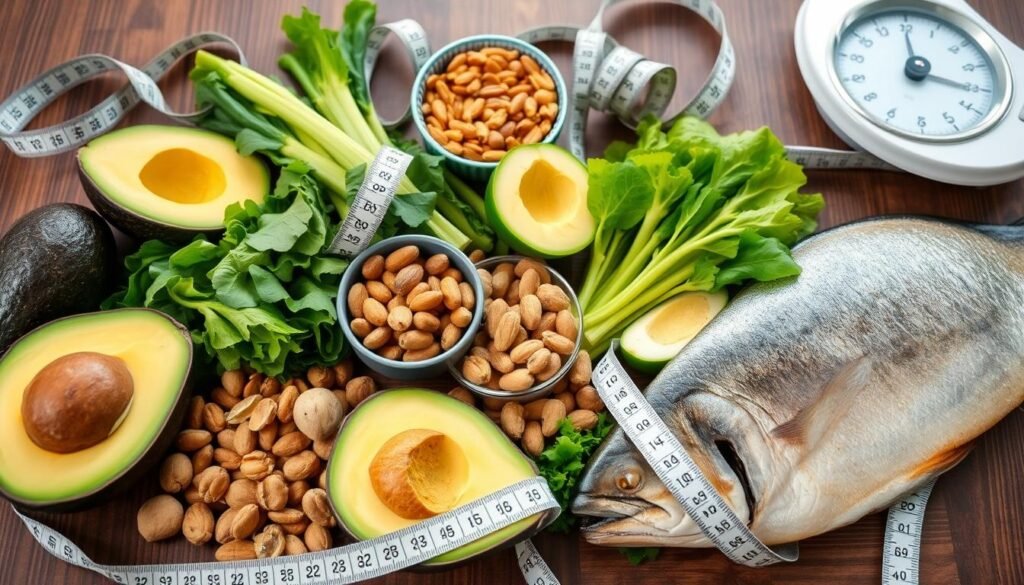How Keto Helps with Weight Loss: Science and Benefits
Does eating more fat to lose weight sound strange to you? The ketogenic diet, or keto, is getting a lot of attention for its unique weight loss method. It cuts down on carbs and boosts fat intake, putting your body in ketosis. But how does this change help you lose weight, and what science backs it up?
In this article, we’ll dive into the keto diet’s science and its many benefits for weight control. You’ll learn how it changes your body’s energy source and boosts metabolic health. See how keto helps with weight loss science to achieve your weight loss goals.
Let’s explore the interesting research and how ketosis aids in fat burning. We’ll also see how keto differs from usual diets and why it might lead to lasting weight loss.
Key Takeaways
- The ketogenic diet focuses on high-fat, low-carbohydrate foods to induce ketosis.
- Ketosis helps the body burn fat more efficiently and can suppress appetite.
- Sticking to under 50 grams of carbs per day is crucial to maintaining ketosis.
- Keto can improve insulin sensitivity and help manage Type 2 diabetes.
- Research supports keto’s benefits for metabolic health and weight management.
- There are potential long-term effects and side effects to consider in a ketogenic diet.
- Intermittent fasting can complement the keto diet for faster entry into ketosis.
What is the Ketogenic Diet?
The ketogenic diet, or keto, is a diet rich in fats, moderate in proteins, and low in carbs. It aims to put your body into a state called ketosis. This diet has become popular for its weight loss benefits and health perks.
Definition of Keto Diet
First introduced in the 1920s, the keto diet has stayed true to its core idea. It swaps carbs for fats to change how your body uses energy. The goal is to enter ketosis, where your body burns fat for fuel instead of carbs. This is why the keto diet is great for losing weight and has many health benefits.
Macronutrient Composition
The keto diet’s success comes from its specific mix of nutrients:
| Nutrient | Percentage of Total Calories |
|---|---|
| Carbohydrates | 5% |
| Protein | 20% |
| Fats | 75% |
On this diet, you get about 75% of your calories from fats, 20% from proteins, and just 5% from carbs. This balance is crucial for entering and staying in ketosis, helping with weight loss.
Examples of Foods in Keto Diet
To follow a keto diet, you need to eat foods that fit its nutritional goals. Here are some good choices:
- Meats: Beef, pork, lamb, poultry, and other unprocessed meats.
- Fish: Salmon, trout, and other fatty fish.
- Eggs: Whole, preferably free-range.
- Dairy: Cheese, butter, cream, and full-fat yogurt.
- Oils: Olive oil, coconut oil, and avocado oil.
- Nuts and Seeds: Almonds, walnuts, chia seeds, and flaxseeds.
- Vegetables: Leafy greens, broccoli, cauliflower, and other low-carb vegetables.
Choosing these foods helps you get the most out of the keto diet. These are the Key elements which plays major role how Keto helps with weight loss. It boosts weight loss and improves your overall health. This method also keeps you full and satisfied, unlike some other diets.
Understanding Ketosis and Its Role in Weight Loss
To understand keto weight loss, knowing about ketosis is key. It’s a state where the body uses fat for energy instead of carbs. This happens when you eat very few carbs.
What is Ketosis?
Ketosis is when your body burns fat for energy, not glucose. It starts when you eat less carbs. Then, your liver makes ketone bodies from fat, which become your main energy source.
How the Body Enters Ketosis
To enter ketosis, you need to eat less than 50 grams of carbs a day for 3 or 4 days. This low carb intake makes your body use stored fat for energy.
Ketosis and Fat Metabolism
When in ketosis, your liver turns fats into fatty acids and ketone bodies. These ketone bodies become your main energy source. This change helps you burn fat steadily, which is key for losing weight.
Certain studies have indicated that people on a ketogenic diet may experience up to 2.2 times more weight loss compared to those on a low-calorie, low-fat diet
| Diet | Weight Loss (Percentage) | Other Benefits |
|---|---|---|
| Keto Diet | 2.2 times more effective | Improved insulin sensitivity, reduced chronic inflammation |
| Low-Carb Diet | 3 times more effective than low-fat diet | Lower blood sugar levels, reduction in cholesterol |
| Low-Fat Diet | Less effective (baseline) | Minimal benefits in comparison |
Understanding ketosis and its role in weight loss helps you see how the ketogenic diet works. The science behind keto weight loss shows it can lead to significant fat loss.
The Science Behind Keto for Weight Loss
The ketogenic diet is popular for its weight loss benefits and metabolic health. It focuses on three main areas: insulin and blood sugar, appetite, and hormonal effects.
Impact on Insulin and Blood Sugar Levels
The ketogenic diet lowers blood sugar and improves insulin sensitivity. It does this by cutting down on carbs. This helps manage and prevent type 2 diabetes.
Studies show that keto diets lower insulin levels. This promotes fat burning and reduces fat storage.
Effects on Appetite and Satiety
The ketogenic diet changes how you feel hunger and fullness. Fats and proteins, key in keto, keep you full longer. This helps control calorie intake.
Research shows that a high-fat, low-carb diet reduces hunger hormone levels. This helps manage cravings.
Hormonal Influences
Keto affects more than just insulin and appetite. Hormones like leptin and ghrelin are also influenced. The diet lowers ghrelin and may increase leptin sensitivity.
This hormonal balance improves metabolic efficiency. It aids in better weight management.
A study found that keto dieters lost 0.9 kg more than low-fat dieters over 12 to 24 months. A systematic review of 11 RCTs showed a 2.2 kg greater weight loss in the keto group at 6 to 24 months. These results highlight the diet’s effectiveness in weight loss.
Losing Weight with the Keto Diet
The ketogenic diet helps you lose weight in several ways. At first, you might lose a lot of water weight. This is because your body uses up glycogen, a type of stored energy.

It takes about a week to start using ketones for energy instead of glucose. This change is key to losing fat. It makes your body more efficient at burning fat.
To enter ketosis, you need to eat less than 50 grams of carbs a day. Some people eat even less. Studies show that people on the keto diet lose more fat than those on other diets.
While you might lose water weight quickly, sticking to the keto diet leads to more fat loss over time. The more you follow the keto lifestyle, the better your weight loss results.
- Increased Satiety: Eating more fats and proteins makes you feel full, helping you eat less.
- Enhanced Fat Burning: Being in ketosis all the time helps your body use stored fat for energy.
- Slight Increase in Metabolic Rate: Making ketones and proteins requires more energy, which can boost your metabolism.
| Diet | Average Fat Loss per Month | Average LDL Levels |
|---|---|---|
| Ketogenic Diet | 1.6 kg | 16% Higher |
| Low-Sugar Diet | 1 kg | 10% Lower |
| Moderate-Sugar Diet | No Significant Loss | Standard Levels |
Sticking to the keto diet long-term can be hard. It’s a good idea to talk to a doctor before starting and to get personally an idea that how Keto helps with weight loss and its science. Even with some concerns, the keto diet can help you lose weight fast and effectively. Its unique benefits, like sustained ketosis and reduced hunger, make it a powerful tool against stubborn fat.
Benefits of Keto for Weight Management
The keto diet is becoming more popular for weight loss. It works by cutting down carbs, making the body burn fat for energy. This change helps reduce belly fat and improves how the body works.
Reduction in Visceral Fat
One key benefit of keto for weight management is fighting belly fat. This fat is deep and linked to health problems like diabetes and heart disease. The keto diet limits carbs to 5% to 10% of daily calories, forcing the body to use fat for energy.
Studies by Duke weight management experts show it reduces belly fat. This helps people reach their weight loss goals.
Improvement in Metabolic Health
The ketogenic diet for fat loss also boosts metabolic health. People on this diet see better blood lipid profiles and lower insulin doses. They also have better blood sugar control.
Health benefits include lower blood pressure and less irritable bowel syndrome and PCOS. With medical help, people lose one to two pounds a week. This supports long-term health.
Regular check-ups every one to two months help keep track of progress. They also solve any problems, ensuring lasting benefits.
How Keto Helps with Weight Loss: Science and Benefits
Switching to the ketogenic diet means your body uses fats instead of carbs for energy. This change helps your body burn fat, leading to weight loss. The diet also makes you feel less hungry, which means you eat fewer calories.
Studies show that people on the ketogenic diet lose more weight than those on low-fat diets. They lose weight faster over six months. This diet is great for losing belly fat, which helps prevent heart disease and type 2 diabetes.
The ketogenic diet does more than just help with weight loss. It also lowers bad cholesterol and raises good cholesterol. This is good for your heart.
It also helps control blood sugar and insulin levels. This is great for people with diabetes and insulin resistance. Plus, it lowers blood pressure, reducing the risk of heart disease and stroke.
This diet also improves metabolic health. It makes LDL particles bigger but fewer in number, which is better for your heart.
In short, the ketogenic diet changes how your body uses energy. It leads to weight loss and improves your health in many ways. It’s a powerful and beneficial diet.
Ketogenic Diet’s Impact on Metabolic Diseases
The ketogenic diet has been studied a lot for its effects on metabolic diseases. It often shows promising results. By looking at how keto affects type 2 diabetes, heart health, and metabolic syndrome, we can see why it’s recommended for better health.
Type 2 Diabetes Management
The ketogenic diet is great for managing type 2 diabetes. Studies show it can lead to big improvements. Patients lost weight, improved their cholesterol levels, and lowered their blood sugar.
These changes are because of better insulin sensitivity and lower blood sugar. This makes keto a good choice for those with type 2 diabetes.
Cardiovascular Health
The ketogenic diet also improves heart health. It helps lower bad cholesterol and triglycerides. At the same time, it raises good cholesterol.
By doing this, it reduces heart disease risk. It also lowers inflammation in the body. This is key for a healthy heart.
Metabolic Syndrome
Metabolic syndrome can be managed with the ketogenic diet. It improves insulin sensitivity and helps with weight loss. This directly tackles the main symptoms of metabolic syndrome.
Research shows it reduces belly fat. This improves weight loss and overall metabolic health.
Potential Long-term Effects of Keto on Weight Loss
The ketogenic diet is becoming more popular, but its long-term effects on weight loss are key. Many see quick results, but keeping up the weight loss can be tough.
Sustainability of the Keto Diet
Many wonder if they can stick to the keto diet long-term. Studies say you should eat less than 50 grams of carbs a day for weeks or even a year. Celebrities like Al Roker and Jenna Jameson have lost a lot of weight on keto.
But, eating so few carbs can be hard. It’s also important to watch your cholesterol and other health markers. Doctors say it’s crucial to talk to a doctor before starting keto.
Weight Loss Plateaus
Many people hit a keto and weight loss plateau as their body gets used to the diet. Studies show people lose weight at first, but then it slows down. By 24 weeks, the weight loss is minimal.

To get past a weight loss plateau, you might need to change your diet and exercise more. Research shows keto can make you less fit for high-intensity activities. Also, eating too much sugar is risky, as a 2019 study in Nutrients found.
Comparing Keto to Other Weight Loss Diets
Understanding different diets is key to losing weight effectively. This section compares the ketogenic diet with low-fat diets and intermittent fasting. We’ll see how they differ and what they have in common.
Keto vs Low-fat Diets
The ketogenic diet and low-fat diets have different approaches to weight loss. Keto focuses on eating a lot of fat, about 70% to 80% of daily calories. It also limits carbs to less than 5%.
Low-fat diets, on the other hand, aim for less than 30% of calories from fat. Keto is stricter with carbs, often under 50 grams a day. This strictness can lead to faster weight loss.
Keto vs Intermittent Fasting
Pairing keto with intermittent fasting boosts fat burning. Intermittent fasting means eating in a set window and fasting the rest of the time. This combo can make your body burn fat faster.
Studies show this mix improves insulin sensitivity and reduces inflammation. It enhances the *keto diet weight loss benefits*.
Overall Effectiveness
The ketogenic diet has its advantages and challenges. It’s great for quick weight loss and reducing belly fat. But, it can be hard to stick to long-term because of its strict rules.
Diets like the Mediterranean diet offer health benefits like lower heart risks and better brain function. They focus on moderate fat intake and lots of fruits and veggies. Choosing the right diet depends on personal preferences and goals.
Despite its challenges, the keto diet’s benefits make it a popular choice for many. It can lead to significant weight loss and improve metabolism.
Common Misconceptions About Keto and Weight Loss
The ketogenic diet has become very popular, but many myths surround it. It’s important to know the truth about these myths. This way, we can truly understand the keto diet weight loss benefits and use the ketogenic weight loss science wisely.
Myths Around Fat Intake
Many think eating lots of fat from keto diets is bad for the heart. But, research shows that unsaturated fats from keto diets don’t harm the heart. Foods like avocado, nuts, seeds, and olive oil are good for the heart and help with metabolism.
Studies also show that keto diets can lower bad fats and blood pressure. They can even increase good cholesterol. This makes it easier to stick to the diet, leading to better keto diet weight loss benefits.
Clarifying Ketosis vs Ketoacidosis
Ketosis and ketoacidosis are not the same. Ketosis is a natural state that helps with weight loss and energy. It happens when you eat about 20 grams of carbs a day. This state helps the body use fats for energy, which is good for weight loss.
Ketoacidosis, on the other hand, is a serious condition mostly seen in type 1 diabetes. It happens when blood ketone levels get too high. It needs medical help. But, a healthy keto diet doesn’t lead to dangerous levels of ketones.
Knowing the difference between ketosis and ketoacidosis helps clear up confusion. It shows that the keto diet weight loss benefits are backed by science.
Case Studies and Research on Ketogenic Weight Loss
The ketogenic diet is becoming more popular because of its impact on weight loss and health. Many studies and personal stories show it works well.
Significant Studies in the Field
Research supports the ketogenic diet’s benefits for weight loss. Studies show it improves insulin sensitivity. This diet focuses on fat, keeping carbs under 50g a day.
It has been shown to help people with weight issues. A 12-month study found it lowered HbA1c and BMI better than other diets.
The World Health Organization says 39% of adults are overweight, 13% obese. This highlights the need for diets like the ketogenic one. It’s high in fat, low in carbs, and improves health and weight.
User Experiences and Testimonials
People share their experiences with the ketogenic diet. They talk about quick weight loss and better health numbers. They also mention better mental focus and energy.
Many say they feel less hungry on this diet. These stories match the findings of big studies. They show the ketogenic diet can help many people lose weight.
Practical Tips for Starting and Maintaining a Keto Diet
Starting a new diet can be tough but rewarding. We’ll share key tips for starting and keeping up with a keto diet. This will help you on your way to a healthier life.
Meal Planning and Preparation
Good meal planning is key when starting keto. Make sure your meals have lots of fat, some protein, and very few carbs. Aim for 60-80% of your calories to come from fat, 10-30% from protein, and 5-10% from carbs.
To keep carbs low, eat non-starchy veggies like kale, broccoli, and spinach. They’re good for you and don’t raise carb levels too much.
Batch cooking is a big help on a keto diet. Cooking meals in bulk saves time and keeps you on track. It’s easier to stick to your diet plan. Remember, drinking plenty of water is also important. Aim for half your body weight in ounces of water each day.
Dealing with Keto Flu
“Keto flu” is common when starting keto. It brings symptoms like tiredness, headaches, and nausea. Drinking lots of water and eating foods rich in electrolytes can help.
Try to eat foods high in sodium and other electrolytes. This helps manage keto flu symptoms. Make sure to drink enough water and replace lost electrolytes like sodium, potassium, and magnesium.
Monitoring Ketosis
It’s important to check if you’re in ketosis. Use tools like urine strips or blood ketone meters to track ketone levels. To stay in ketosis, keep carb intake between 20-50 grams a day.
Too many carbs or protein can stop ketosis. This can slow down your weight loss. So, stick to your carb limits and keep an eye on your ketone levels.
| Parameter | Details |
|---|---|
| Carbohydrate Intake | 5-10% of daily calories |
| Protein Intake | 10-20% of daily calories |
| Fat Intake | 70-80% of daily calories |
| Daily Carb Limit | 20-50 grams |
| Recommended Sodium | 3,000-5,000 mg |
| Recommended Water Intake | Half your body weight in ounces |
Learn the mistakes to avoid and calculate progress with our BMI Calculator for Keto, also understand Body Mass index for Keto
Conclusion
The ketogenic diet is backed by science for weight loss and health. It works by using ketosis to manage weight and improve health. Studies show it’s great for keeping weight off over time.
Research has found that the keto diet leads to more weight loss than low-fat diets. People on a very-low-carb keto diet also see better insulin sensitivity and fat loss. These results highlight the diet’s effectiveness in losing weight and improving health.
But, it’s important to watch out for side effects and long-term effects. Short-term issues like the “keto flu” can be handled, but long-term problems like bad cholesterol and nutrient gaps need attention. With careful planning, the keto diet can be a powerful tool for managing weight.
FAQ
What is the ketogenic diet?
What is the macronutrient composition of the keto diet?
Can you give examples of foods included in the keto diet?
What is ketosis?
How does the body enter ketosis?
How does ketosis enhance fat metabolism?
What impact does the ketogenic diet have on insulin and blood sugar levels?
How does the keto diet affect appetite and satiety?
What hormonal influences does the keto diet have?
How effective is the keto diet for losing weight?
What are the benefits of keto for weight management?
How does the ketogenic diet help manage metabolic diseases?
What are the potential long-term effects of the keto diet on weight loss?
How does the keto diet compare to other weight loss diets?
What are some common misconceptions about the keto diet and weight loss?
What does research say about ketogenic weight loss?
What practical tips can help in starting and maintaining a keto diet?

I’ve followed a low-carb and ketogenic lifestyle for over five years, gaining hands-on experience with what is practical, sustainable, and realistic in daily life. My work is informed by continuous self-education through reputable nutrition research and publicly available medical literature.
Read more about the founder →



